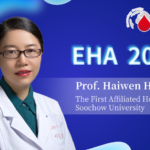
Chronic myeloid leukemia (CML) requires long-term treatment, emphasizing the importance of both efficacy and long-term safety and tolerability to achieve treatment goals, including treatment-free remission (TFR). Asciminib (ASC) is the first specific inhibitor targeting the ABL myristoyl pocket (STAMP) of BCR:ABL1, offering high specificity and minimal off-target effects. From June 13-16, 2024, the 29th Annual Meeting of the European Hematology Association (EHA) was held in Madrid, Spain. At the conference, an international multicenter phase III randomized controlled study, ASC4FIRST (NCT04971226), compared the efficacy and safety of ASC with standard first-line TKIs for newly diagnosed CML patients. The results demonstrated that ASC as a first-line treatment for newly diagnosed CML has superior efficacy, safety, and tolerability compared to current TKIs. We have invited Professor Bingcheng Liu from the Leukemia Treatment Center at the Institute of Hematology & Blood Diseases Hospital, Chinese Academy of Medical Sciences , to review this study.Study Overview
Study Methods
Adults newly diagnosed with CML within three months, who had received imatinib (IMA) or second-generation TKIs (2G TKIs) for ≤2 weeks before randomization, signed informed consent. Patients were stratified by ELTS risk and pre-randomization selection (PRS) TKI (IMA or 2G TKI), and randomized 1:1 to receive ASC 80 mg once daily (ASCIMA, ASC2G) or standard-dose PRS TKI (IS TKIIMA, IS TKI2G). The PRS TKI was chosen by the investigator based on the patient’s condition. The primary endpoints included: comparing the major molecular response (MMR) rate at 48 weeks between ASC and investigator-selected (IS) TKI; comparing ASCIMA and IS TKIIMA 48-week MMR rates; achieving either target was considered meeting the study endpoint. Secondary endpoints included comparing ASC2G and IS TKI2G 48-week MMR rates.
Study Results
201 patients received ASC treatment, with 101 and 100 patients randomized to ASCIMA and ASC2G, respectively, and 204 patients received IS TKI treatment, with 102 patients each for IS TKIIMA and TKI2G. Among the TKI2G group, nilotinib (NIL) accounted for 48%, dasatinib (DAS) for 41%, and bosutinib (BOS) for 11%. The median follow-up times were 16.3 months for the ASC group and 15.7 months for the IS TKIs group. As of November 28, 2023, 86%, 62%, and 75% of patients continued ASC, IMA, and 2G TKI treatments, respectively.
The 48-week MMR rate was higher for ASC compared to IS TKI (67.7% vs 49.0%), and ASCIMA was superior to IS TKIIMA (69.3% vs 40.2%), achieving both primary endpoints with significant statistical differences. The efficacy differences were 18.9% (95% CI: 9.6%–28.2%) and 29.6% (95% CI: 16.9%–42.2%), both P<0.001. The 48-week MMR rate for the ASC2G group was also higher than the IS TKI2G group (66.0% vs 57.8%). The early and deep molecular response rates were higher in the ASC group compared to IS TKI, IS TKIIMA, and IS TKI2G groups.
Consistent with known safety profiles, ASC showed better safety compared to IMA and 2G TKIs. All-grade adverse events (AEs) (≥25%) included thrombocytopenia (28%, 28%, 34%), neutropenia (25%, 31%, 34%), diarrhea (16%, 26%, 25%), and anemia (12%, 26%, 23%). Grade ≥3 AEs (≥6%) included thrombocytopenia (13%, 6%, 14%), neutropenia (10%, 17%, 18%), and elevated alanine aminotransferase (2%, 2%, 8%); arterial occlusive events occurred at rates of 1%, 0%, and 2%, respectively. AE-related discontinuations and dose adjustments were lower in the ASC group compared to IMA and 2G TKIs, indicating better tolerability.
Study Conclusion
In the ASC4FIRST study, for newly diagnosed CML, head-to-head trial results showed ASC has superior efficacy, higher early and deep molecular response rates, and better safety and tolerability compared to current standard first-line TKIs (IMA and 2G TKIs such as NIL, DAS, BOS). ASC has the potential to facilitate TFR. ASC can be considered a first-line treatment option for newly diagnosed CML patients, reducing treatment transitions while further promoting the achievement of CML treatment goals.
Expert Commentary
Professor Bingcheng Liu: TKI therapy has revolutionized the outcomes for CML patients, with some achieving sustained deep molecular responses and successfully attaining TFR under long-term TKI treatment. However, many patients still require long-term treatment. Therefore, improving TFR while ensuring long-term safety and tolerability remains an unmet clinical need. This randomized controlled study showed that the new STAMP inhibitor ASC has superior efficacy in newly diagnosed CML compared to classic first-line ATP-site binding BCR::ABL1 inhibitors (IMA and 2G TKIs like NIL, DAS, BOS), with faster and deeper molecular response rates. Early molecular response is associated with long-term outcomes and deep molecular remission, suggesting ASC has the potential to increase TFR. Furthermore, ASC showed lower hematologic and non-hematologic toxicity, fewer treatment interruptions, and dose adjustments, indicating better safety and tolerability. This study suggests ASC may be suitable for patients of all ages and with various comorbidities. Of course, long-term efficacy and safety data for ASC still need further follow-up.


